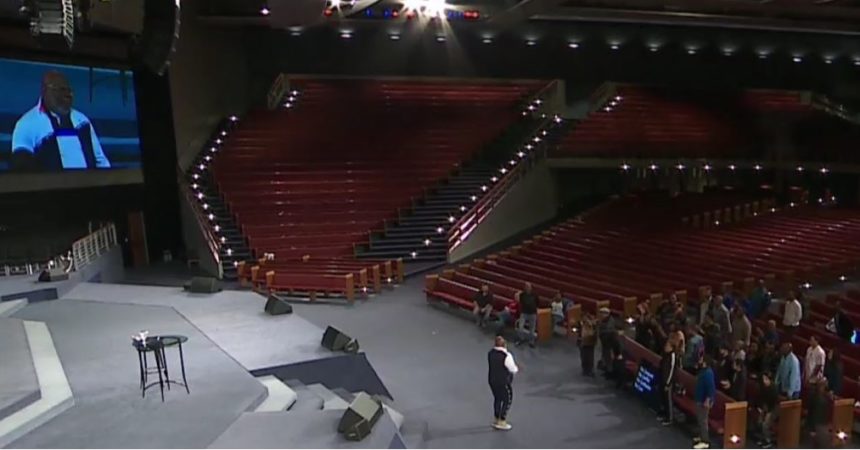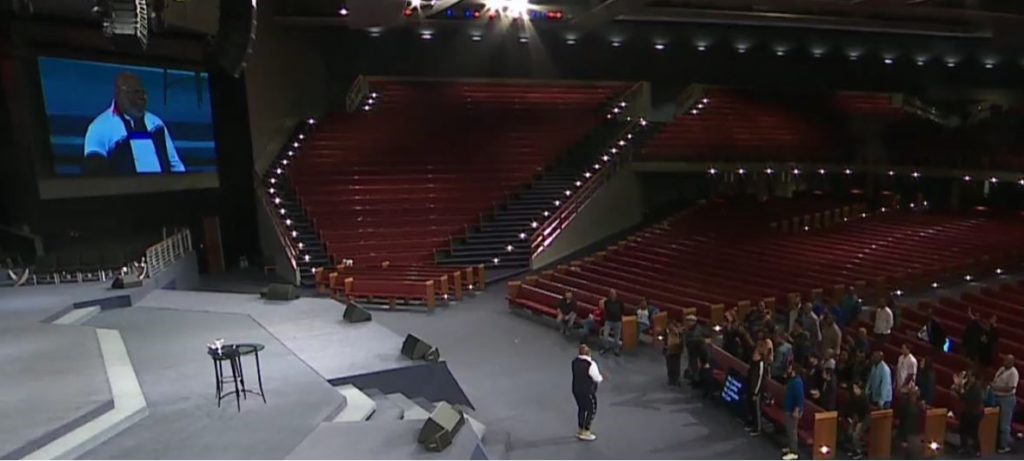
People facing new ways of life as COVID 19 has changed everything
Rev. Grainger Browning, pastor of the Ebenezer African Methodist Episcopal Church in Fort Washington, Md., is used to preaching to two packed sanctuaries every Sunday. But two Sundays ago, Browning and a skeletal staff preached to a mostly empty sanctuary while his members watched on the Internet.
“I feel like a spiritual first responder,” Browning said. “It’s called Live from the church. We try to duplicate church as much as we can. We have members of the praise team and a skeletal staff.”
Browning’s situation is one example of a new reality for churches around the nation. Even the 8,200-seat sanctuary of Bishop T. D. Jakes’ Potter’s House in Dallas has been virtually empty. As the Coronavirus spread around the nation and world and as state governments and health experts increasingly issue stay at home orders and suggest social distancing, life as usual has become non-existent.

Bishop T. D. Jakes stands before about 30 people in his Potter’s House sanctuary that seats 8,200 in Dallas.
Photo special to the Outlook
Members of the Class of 2020 are still hoping for their proms, commencement exercises and celebrations that are normal milestones for generations past.
In sports, there are no NBA basketball games, NCAA tournaments or baseball Spring training. And in terms of mass gatherings, going to the movies, eating out, and even worshipping God in church pews has been forbidden for a season. Even weddings and funerals have been curtailed.
As a result of the Corvid 19 virus, this lethal strain of the Corona flu, America is a stranger to herself with frightened and helpless citizens “sheltering in place” behind locked doors in a society where toilet paper has become priceless as indicated by the empty shelves in grocery stores.
“People are losing it. My brother drives a bread truck and he said that his colleague was robbed, said Sean Brown, 39, a financial manager in Severn, Md. “They took his entire bread truck.”
As of late last week, America had more than 30,000 people diagnosed with COVID 19, which means America is now number one in the world in terms of a disease that has now killed more than 13,000 around the globe. This is despite glaring headlines and weekly White House briefings that produced more arguments than solutions.
“If ever there is a time to practice humanity — it is now,” said New York Governor Andrew Cuomo in a tweet on Sunday. “The time to show kindness, to show compassion. New Yorkers are tough — but we are also the most courageous community that you have ever seen.”
Last Sunday, Sean Brown, the financial manager, a husband and father of two, watched a taped worship service from the University Park Church of Christ. Despite the change, he still has hope through his faith. “It is important to remember who is in control. God is still in control.”
COVID 19 has ushered in an era of “social distancing.” And yet it is easy to find examples of hope in cities and towns and communities across America in terms of faith, family and every aspect of life.
On Twitter, there was a video of a group of Cuban doctors of color in white lab coats and masks arriving in Italy and being greeted by people waiting in the international airport. As restaurants closed, many soup kitchens that regularly feed the homeless, such as Miriam’s Kitchen in Northwest Washington, D.C., kept their doors open. But among the most notable changes are the churches which quickly adjusted their empty sanctuaries to computer screens and conference calls.
Rev. Dr. Leslie Copeland Tune, Chief Operating Officer for the National Council of Churches, said despite the Coronavirus “Most churches are using creative (ways) to remain connected. They are using zoom, video conferencing, prayer calls. My home church in New York is having prayer callers at 6 am.”
With Easter two weeks away, Browning said that he will have Lenten services every morning between six and seven AM that will be rebroadcast “people can start their day,” but Browning added, “I really missing the people it is like being away from your wife.”
“My concern is for the people. There is concern about people dying but I don’t think I hear a heart for the people who survive. They literally don’t know how they are going to eat.”
Browning of Ebenezer in Maryland said he is really concerned about conducting funerals when there is a restriction. “Right now, can’t have more than ten people. I can’t imagine having a love one dying and there are only 10 people there.”
Even medical doctors are taken aback by the new realities.
“We had our church by telephone conference,” said Tracey Burney, a retired urologist who attends Bethany CME Church in Clearwater, Fla. “Being a physician, we are always ready for the worst. But I have never seen anything like this in my wildest dreams.”







